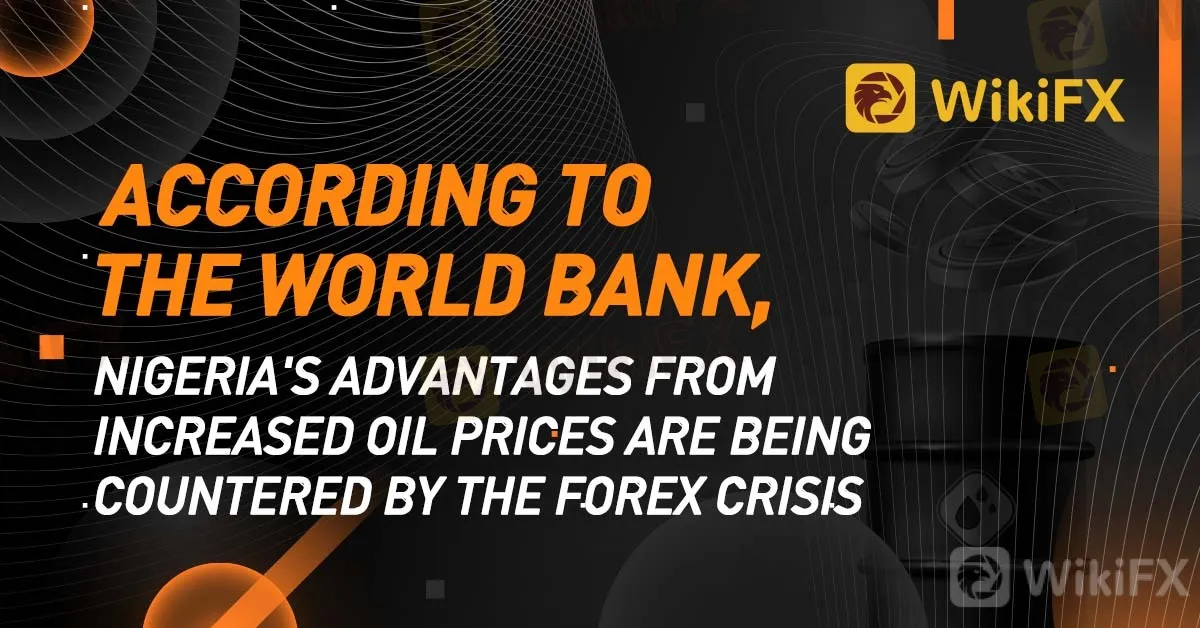简体中文
繁體中文
English
Pусский
日本語
ภาษาไทย
Tiếng Việt
Bahasa Indonesia
Español
हिन्दी
Filippiiniläinen
Français
Deutsch
Português
Türkçe
한국어
العربية
ACCORDING TO THE WORLD BANK, NIGERIA'S ADVANTAGES FROM INCREASED OIL PRICES ARE BEING COUNTERED
Abstract:According to the World Bank, foreign exchange problems, high inflation, and budgetary constraints caused by fuel subsidies distort the advantages of a developing non-oil industry and high oil prices.

According to the World Bank, foreign exchange problems, high inflation, and budgetary constraints caused by fuel subsidies distort the advantages of a developing non-oil industry and high oil prices.
Nigeria's development prospects for the next three years have improved, owing mostly to a stronger non-oil recovery and higher global oil prices. Nigeria's macroeconomic framework, on the other hand, has deteriorated, leaving the country more exposed to global and internal shocks.
The World Bank revealed this in a report titled 'Nigeria Development Update (June 2022): The Continuing Urgency of Business Unusual.'
According to the World Bank, the deterioration of Nigeria's macroeconomic framework is mostly attributable to a lack of coordinated measures to lower inflation, handle budgetary constraints, and tighten exchange rate management.
What the World Bank has to say
According to the World Bank, rising oil prices caused by the Ukraine crisis would enhance Nigeria's economic development, but less than expected.
“As in other oil-producing countries, rising oil prices normally enhance Nigeria's fiscal and external situation, increasing exports and public expenditure,” according to the Bank. Furthermore, they benefit the non-oil sector, notably manufacturing and services, through income spillover effects. However, unlike past periods of high oil prices, Nigeria is not anticipated to completely capitalize on the windfall this time.
“This is because the benefit of increasing oil prices is countered by decreasing oil output, which was 1.5 million barrels per day (bpd) in May 2022, the lowest in 15 years.” The continued petrol subsidy offsets fiscal benefits.
According to the World Bank, Nigeria is in a paradoxical scenario in which growth prospects have improved yet the broader macroeconomic framework is worsening.
“Our updated forecasts for inflation, the budget deficit, and public debt imply a more fragile macroeconomic position in 2021 and the first half of 2022,” the Bank wrote, “which is further exacerbated by the rising premium between the official and parallel (black market) exchange rates.”
“The deterioration of Nigeria's macroeconomic framework is primarily attributable to the absence of coordinated actions to decrease inflation, resolve budgetary constraints, and tighten exchange rate management,” the Bank stated. As a result, inflation in 2022–2023 is predicted to be two percentage points higher than in our baseline scenario six months ago.
SOMETHING YOU SHOULD BE AWARE OF
· Nigeria's Gross Domestic Product (GDP) increased by 3.11 percent year on year in the first quarter of 2022. However, the Nigerian economy's oil sector dropped by 26.04 percent year on year in Q1 2022, a decrease of 23.83 percent points from the pace recorded in the same quarter in 2021.
· Nigeria's inflation rate increased to 17.71 percent, the highest in 11 months, from 16.82 percent in April 2022. Food inflation grew by 19.5 percent year on year in May 2022, marking a 1.13 percent point increase over the previous month's figure of 18.37 percent and a 2.78 percent reduction over the same time in 2021. (22.28 percent ).
· Nigeria's international trade increased to N13 trillion in the first quarter of 2022, up 11.1 percent from N11.7 trillion in the previous quarter and 65.4 percent from N7.86 trillion in Q1 2021. This is according to the National Bureau of Statistics' recently issued international trade report for the first quarter of 2022. (NBS).
· Total imports in Q1 2022 was N5.9 trillion, a 0.67 percent decrease from Q4 2021 (N5.94 trillion), but a 21.04 percent increase over the same time in 2021. (N4.88 trillion).
· Nigeria's export income in the first quarter of 2022 was N7.1 trillion, an increase of 23.1 percent and 137.9 percent over the first and fourth quarters of 2021, respectively.
· At the time of writing, the parallel market exchange rate is N607/$1, while the Investors and Exporters (I&E) window rate is N420.5/$1.

Disclaimer:
The views in this article only represent the author's personal views, and do not constitute investment advice on this platform. This platform does not guarantee the accuracy, completeness and timeliness of the information in the article, and will not be liable for any loss caused by the use of or reliance on the information in the article.
Read more

Trader Exposes Unethical Practices by STP Trading
A recent allegation against STP Trading has cast doubt on the firm's business practices, highlighting the potential risks faced by retail traders in an increasingly crowded and competitive market.

What Makes Cross-Border Payments Easier Than Ever?
Cross-border payments are now faster, cheaper, and simpler! Explore fintech, blockchain, and smart solutions to overcome costs, delays, and global payment hurdles.

FCA Identifies Clone Firm Exploiting Admiral Markets' Credibility
The UK Financial Conduct Authority (FCA) has issued a public warning regarding a fraudulent entity impersonating Admiral Markets, a legitimate and authorised trading firm. The clone firm, operating under the name Admiral EU Brokers and the domain Admiraleubrokerz.com, has been falsely presenting itself as an FCA-authorised business.

Malaysian Man Loses RM113,000 in Foreign Currency Investment Scam
A 57-year-old Malaysian man recently fell victim to a fraudulent foreign currency investment scheme, losing RM113,000 in the process. The case was reported to the Commercial Crime Investigation Division in Batu Pahat, which is now investigating the incident.
WikiFX Broker
Latest News
eToro Expands Nationwide Access with New York Launch
Webull Partners with Coinbase to Offer Crypto Futures
Why Is UK Inflation Rising Again Despite Recent Lows?
Hackers Charged for $11M Crypto Theft Using SIM-Swaps
Role of Central Banks in the FX Market
FCA Alerts Against Sydney FX
What Makes Cross-Border Payments Easier Than Ever?
Trader Exposes Unethical Practices by STP Trading
Interactive Brokers Launches Tax-Friendly PEA Accounts in France
Google Warns of New Deepfake Scams and Crypto Fraud
Currency Calculator


